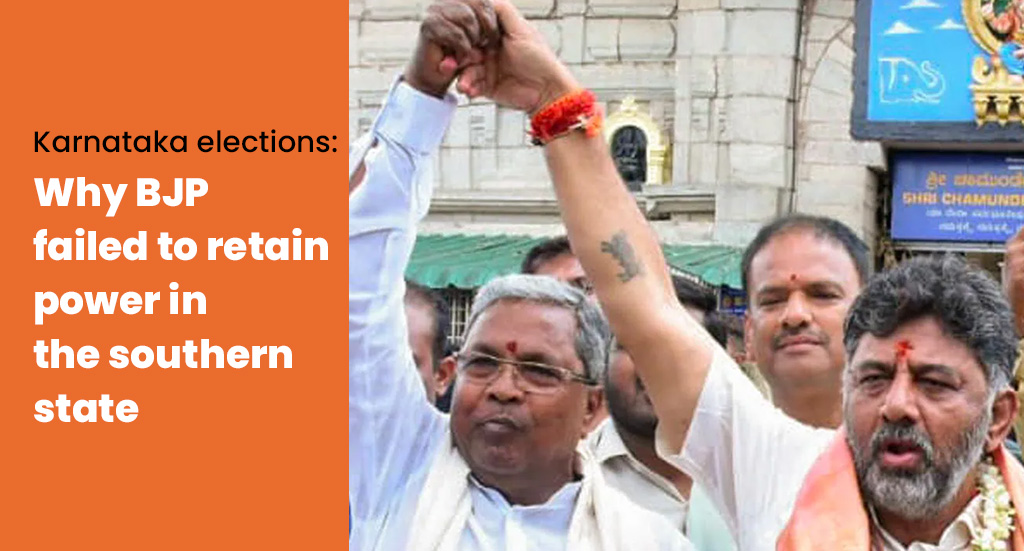The Congress returned to power in Karnataka after 10 years in the assembly elections with a thumping victory, winning 137 out of 224 seats. The incumbent BJP could manage only 65 seats while the Janta Dal won 19 seats. The Congress won with a huge margin in the Old Mysuru, Mumbai Karnataka, Hyderabad Karnataka, and Central Karnataka regions, while the BJP was only able to maintain its hold on the Coastal Karnataka region. With the loss in Karnataka, the party has failed to establish a foothold in the state it considers as the “gateway to the South”. Here’s a breakdown into the reasons for the BJP’s poor show in Karnataka.
Anti-incumbency: The BJP was unable to stem the anti-incumbency wave against the party. Karnataka has never voted an incumbent party back to power in over three decades. The state’s voters were resentful of the fact that the government did not deliver on the expectations of the people.
Corruption: The Congress’ 40% government’ tag accusing the Basavraj Bomai government of corruption played a role in ensuring the
BJP’s defeat. The controversy snowballed after Santosh Patil, a 40-year-old contractor who had accused senior BJP leader and minister K S Eshwarappa of tormenting him for a 40 per cent commission, was found dead in a hotel. Eshwarappa was subsequently removed from the cabinet. However, the damage had been done and cost the BJP dearly in the elections.
No Lingayat face: The BJP sidelined prominent Lingayat leader BS Yeddyurappa who had helped build the party in Karnataka. The party also denied tickets to former chief minister Jagadish Shettar and former deputy CM Laxman Savadi, also prominent Lingayat faces, who switched over to the Congress. The Vokkaligas also got disillusioned with the BJP due to inadequate representation in the candidates list. The Dalits and Kurubas also preferred to vote for the Congress because of their loyalty to AICC president Mallikarjun Kharge and former CM Siddaramaiah, respectively.
Rahul Gandhi’s Bharat Jodo Yatra: The Congress leader’s Bharat Jodi Yatra is a contributing factor to Congress’ win and the BJP’s defeat in Karnataka. Rahul campaigned for 21 days in the state, re-energising the party’s cadre and laying the base for its spirited performance in the state. The Congress performed exceptionally well in the districts through which Rahul travelled- Ballari, Chamarinagar, Chitradurga, Mandya, Mysuru, Raicur, and Tumakuru.
Hindutva ploy backfired: The BJP failed to polarise voters on communal lines. Its move to end 4% OBC reservation to Muslims alienated the community and rallied it behind the Congress. The party reached out to the Muslim bodies, asking them to exercise restraint and reportedly offered them a deal that they would restore the quota if they came to power. Other communal issues raised by the BJP, including Hijab, Halal, and Tipu Sultan turned out to be non-starters.
DK Shivakumar, Siddaramaiah’s efforts: Karnataka Congress chiefDK Shivakumar and Siddaramaiah worked hard to restore the party’s fortunes in the state. Shivakumar asked party leaders to avoid getting drawn into a face-off with the BJP and keep their focus on real issues. He transformed the party into a single unit instead of disparate groups with divided loyalties. Siddaramaiah, the more popular face of the party, won by more than 45,000 votes. He called a victory a ‘mandate against Narendra Modi and Amit Shah’.








